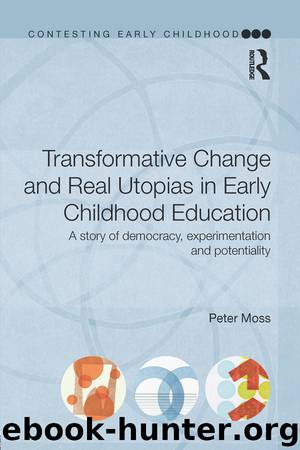Transformative Change and Real Utopias in Early Childhood Education by Peter Moss

Author:Peter Moss
Language: eng
Format: epub
ISBN: 9781317700869
Publisher: Routledge
What are the fundamental values?
Erik Olin Wright, who I have already introduced in Chapter 1 along with his concept of ‘real utopias’, proposes three principles – or values – as the foundations for what he terms an ‘emancipatory social science’ and a just society:
Equality: in a socially just society all persons would have broadly equal access to the material and social means needed to live a flourishing life.
Sustainability: future generations should have access to the social and material means to live flourishing lives at least at the same level as the present generation.
Democracy: in a fully democratic society, all people would have broadly equal access to the necessary means to participate meaningfully in decisions about things which affect their lives.
(Wright, 2012)
I have already argued the importance of equality for a well-functioning society and of sustainability for a society with any worthwhile future. So I readily accept these values as being necessary for a just society. I also agree on the centrality of democracy to a just society, and will discuss its meanings and applications in the next chapter. In short, I acknowledge these to be foundational values for all aspects of society, including early childhood education, and for flourishing lives.
I would, however, add a number of other values to this trio, values that are also fundamental to my concept of education. Solidarity expresses a commitment to collaboration, collegiality and mutual support on matters of shared interest; it recognises individuality, but acknowledges that this is always constructed in relation with others and is enabled by and enacted through common purpose, collective effort and sharing risk (e.g. public education, public health, public space). It is a value that also expresses interdependency, obligation and responsibility, and contests a self-interested autonomy. Diversity acknowledges the alterity of the Other, the singularity of human beings, as well as the irreducible multiplicity of values, perspectives, identities and ways of life. If solidarity and diversity might seem to be at odds, Michael Hardt and Antonio Negri in their book Multitude discuss the possibility, indeed necessity, of a relationship between singularity (absolute otherness) and commonality. While insisting on singularity – ‘a social subject whose difference cannot be reduced to sameness’ – they also insist that there is nothing to ‘prevent the singularities from acting in common’ and forging solidarities (Hardt and Negri, 2005, pp. 99, 100, 105):
Once we recognise singularity, the common begins to emerge. Singularities do communicate, and they are able to do so because of the common they share. We share bodies with two eyes, ten fingers, ten toes; we share life on this earth; we share capitalist regimes of production and exploitation; we share common dreams of a better future. Our communication, collaboration, and cooperation, furthermore, not only are based on the common that exists but also in turn produce the common. We make and remake the common we share every day.
(ibid., p. 128)
What Hardt and Negri contest is a binary of two conflicting opposites: either atomised individualism or an aggregate that subsumes all difference into a faceless and standardised mass or a chaotic and incoherent mob.
Download
This site does not store any files on its server. We only index and link to content provided by other sites. Please contact the content providers to delete copyright contents if any and email us, we'll remove relevant links or contents immediately.
| Administration | Assessment |
| Educational Psychology | Experimental Methods |
| History | Language Experience Approach |
| Philosophy & Social Aspects | Reform & Policy |
| Research |
The Art of Coaching Workbook by Elena Aguilar(51159)
Trainspotting by Irvine Welsh(21637)
Twilight of the Idols With the Antichrist and Ecce Homo by Friedrich Nietzsche(18620)
Fangirl by Rainbow Rowell(9228)
Periodization Training for Sports by Tudor Bompa(8252)
Change Your Questions, Change Your Life by Marilee Adams(7758)
This Is How You Lose Her by Junot Diaz(6877)
Asking the Right Questions: A Guide to Critical Thinking by M. Neil Browne & Stuart M. Keeley(5757)
Grit by Angela Duckworth(5604)
Red Sparrow by Jason Matthews(5465)
Paper Towns by Green John(5177)
Room 212 by Kate Stewart(5105)
Ken Follett - World without end by Ken Follett(4722)
Housekeeping by Marilynne Robinson(4436)
The Sports Rules Book by Human Kinetics(4379)
Papillon (English) by Henri Charrière(4261)
Double Down (Diary of a Wimpy Kid Book 11) by Jeff Kinney(4261)
The Motorcycle Diaries by Ernesto Che Guevara(4089)
Exercise Technique Manual for Resistance Training by National Strength & Conditioning Association(4060)
